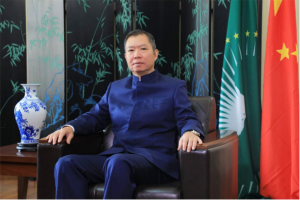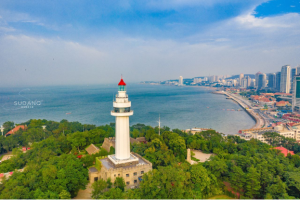Middle East powerhouses Saudi Arabia and the UAE are helping regional partners needing more access and assistance to meet their climate goals, a United Nations Development Program official told Al Arabiya English.
Dr Kishan Kodhay said that events like the MENA Climate Week, which took place in Dubai ahead of COP27 in Sharm el-Sheikh last year, helped bring together countries in the region.
“We’ve seen large delegations of youth groups sharing their vision for the future, but also other partners such as industry, bringing together both UN agencies as well as IFIs (International Financial Institutions) and, of course, government representatives from across the region, and NGOs, universities. And this brings collective thinking on the challenges and solutions in advance of COP and a regional perspective into the COP,” Khoday told Al Arabiya English on the sidelines of the week-long event.
This sharing of knowledge bilaterally is beneficial for both the host nation and for delegates who can exploit tried and tested solutions.
For instance, energy efficiency, its study and implementation, is an aspect of renewable energy transition that Saudi Arabia is excelling in, Kodhay said. The UNDP, which has had a presence in the region for over 50 years, has reportedly been partnering with the Kingdom to offer “technical assistance.”
“For every unit of GDP growth, there’s less and less carbon footprint, less and less energy use. We’re trying to reduce the energy intensity of development and decarbonize the development pathway.”
He added that it was important to work with energy-intensive industries and provide new technology and financial instruments to reign in the curve.
The UNDP official pointed out the policies, regulations, and industry partnerships of the Saudi Energy Efficiency Program, which was established in 2010 by the Kingdom to raise the efficiency of the industry, construction and land transport sectors.
“Having Saudi Arabia as a constructive partner on the global and regional development agenda, it’s good to see their support to other countries across the region and having this kind of dialog,” the UNDP official said.
Political stability
Countries like Saudi Arabia, with a high level of political stability, are a “great asset” for organizations like the UN Food and Agriculture Organization, another senior official told Al Arabiya English on the sidelines of the MENA Climate Week.
Ayman Omer, the FAO Program Director in Saudi Arabia, said in places of political and economic instability, there needs to be a contingency plan, something he has experienced in his home country, Sudan.
But in the GCC, where the political and economic situation is widely considered stable, Omer said one can “envision the future” and “contribute to the long-term vision of the content of the country.”
Despite being an arid, desert country with hot summers and scarce water resources, Saudi Arabia has regions in the south where agriculture thrives. Saudi Arabia is the second-largest date manufacturer in the world. It also has large poultry and cattle farms.
It does, however, depend on imports for its dietary needs – nearly 80 percent of the Kingdom’s food is imported.
The FAO, he said, works closely with the Saudi Ministry of Environment, Water and Agriculture on improving the food system, natural resource management, efficient irrigation and mitigation of water scarcity, and technical assistance on building national capacity on critical areas.
The partnership has reportedly been in place for over 70 years, which Omer said helped put forth and see through to adaptation, policy matters backed by research and evidence.
This level of symbiosis has resulted in a secure food system despite its import dependency, Omer said.
“No one can deny that there is a very high level of security in the country,” the FAO official said, citing the example of the Kingdom’s resiliency to the global impact on food security during COVID-19 when international logistics were affected.
“There was disturbance in terms of food supply and food prices all over the world. But in Saudi Arabia, the impact of these extended factors on food security was quite minimal, and I think that is mainly due to the policies in terms of food imports.”
Part of Saudi Arabia’s means of adapting to its climate and environment in the food sector includes research and development of new tech that can enable growing crops in its desert landscape.
Al Arabiya English earlier heard from Saudi-based scientists on how they are developing seed technology and designing efficient greenhouses that can help grow plants in harsh conditions – perfect for the Middle East that is scorching hot and water scarce.
Measures to ensure food security and sufficiency also include international investments in agricultural companies and in new techs like vertical farming and alternative-to-meat produce.
Water, water everywhere… and drought Despite the recognition and rapid rise in adapting to the changes brought by the deteriorating climate situation, the MENA region is still vulnerable to its effects that are already apparent through the wildfires, droughts and heat waves, Al Arabiya English learns.
“The impact in general or the vulnerability element of climate action in the region rotates around water, around sand and dust storms, and around sea level rise,” said Tarek Alkhoury, the Regional Coordinator for Climate Change at UNEP, specifically cautioning countries like Bahrain and Qatar.
And despite rising water levels being a threat to Gulf states, which are coastal, water shortage is already a reality in Iraq and Jordan – and this can intensify across the hot and arid Middle East.
Speaking to Al Arabiya English on the sidelines of the MENA Climate Week, Alkhoury said: “We need to do more assessment and we need to do more national adaptation planning to be ready to reduce the risk of climate change impacts in the future and to take action at the right time to prevent this impact of climate change on the people, wellbeing, health and security.”
Alkhoury advises senior management on climate change, identifies gaps in knowledge, plans strategic engagement of UNEP, and supports the government on the technical front.
“We are seeing a huge interest and political will to be part of the climate action” in the GCC, he said. “This is obvious by having two Arab countries hosting two COPs in the region,” he added, pointing at the upcoming 28th edition of the UN climate conference in Dubai.
BY STAFF REPORTER
Source: Alarabiya
THE ETHIOPIAN HERALD FRIDAY 13 OCTOBER 2023





